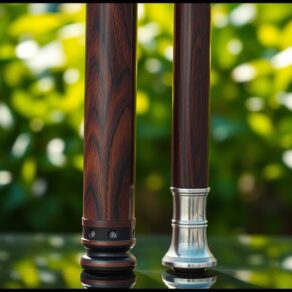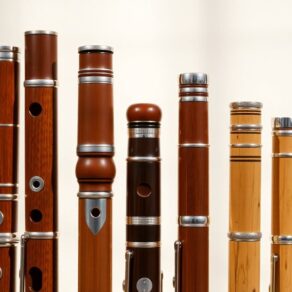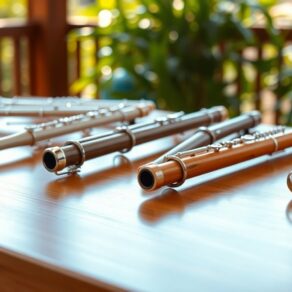Choosing a flute for different music genres hinges on material and design. For classical music, silver flutes offer bright tones, whereas gold flutes provide warmth. In jazz, both silver and gold enhance rich sound and quick movements. Folk music often favors wooden flutes for their earthy resonance. Contemporary flutes, made from silver, gold, or carbon fiber, marry tone with durability. If you're in a marching band, prioritize lightweight and sturdy instruments. World music flutes evoke unique cultural sounds, like the bamboo flute. Understanding these nuances guarantees you pick the best instrument for your style and enhances your performance. You'll discover even more insights ahead.
Key Takeaways
- Material Selection: Choose materials like silver for classical and jazz flutes, while wooden flutes are ideal for folk music genres.
- Technique Adaptability: Consider the performance techniques; classical flutes excel in breath control, while jazz flutes support improvisation and rapid note changes.
- Design Features: Opt for open-hole flutes for classical music's nuanced fingerings, and lightweight designs for comfort in marching bands.
- Genre-Specific Characteristics: Each genre has distinct tonal qualities; gold flutes offer warmth for jazz, while bamboo flutes resonate with folk traditions.
- Maintenance Needs: Prioritize easy cleaning and moisture management to ensure optimal performance across different musical settings and prolong flute lifespan.
Classical Music Flutes
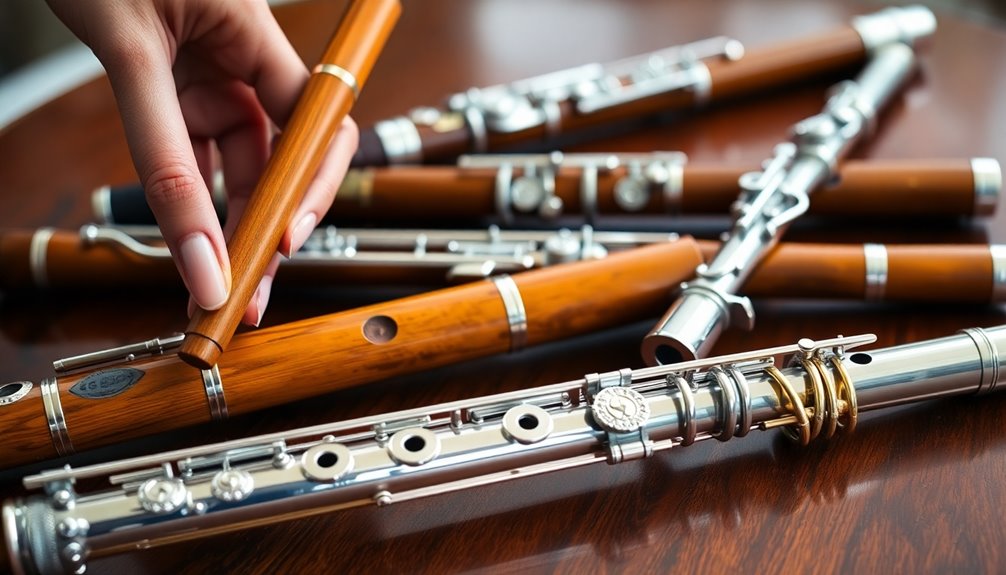
When it comes to classical music, the choice of flute can markedly impact your sound and performance. Selecting the right flute materials plays an essential role in shaping your tone. Common materials include silver, gold, and even wood, each producing distinct tonal qualities.
For instance, silver flutes often deliver a bright, clear sound, while gold flutes provide a warmer, richer tone. Wood flutes, on the other hand, can evoke a unique, earthy sound that's particularly cherished in certain classical pieces.
Understanding flute techniques is equally important. Mastering breath control, finger agility, and articulation can elevate your performance. With a well-crafted flute, your ability to execute techniques like vibrato or trills will be enhanced, making your interpretation of classical pieces more expressive.
Moreover, consider the flute's key system. Open-hole flutes allow for more nuanced fingerings and can expand your dynamic range, while closed-hole flutes offer greater ease of use for beginners. Your choice of flute can influence not just your sound but also your comfort while playing.
Ultimately, the combination of the right materials and techniques is essential for achieving the best classical sound. Open-hole flutes provide enhanced control over dynamics and timbre, allowing for more expressive performances. Whether you're a seasoned player or just starting, finding a flute that resonates with your style will help you feel more connected to the music.
Jazz Flutes
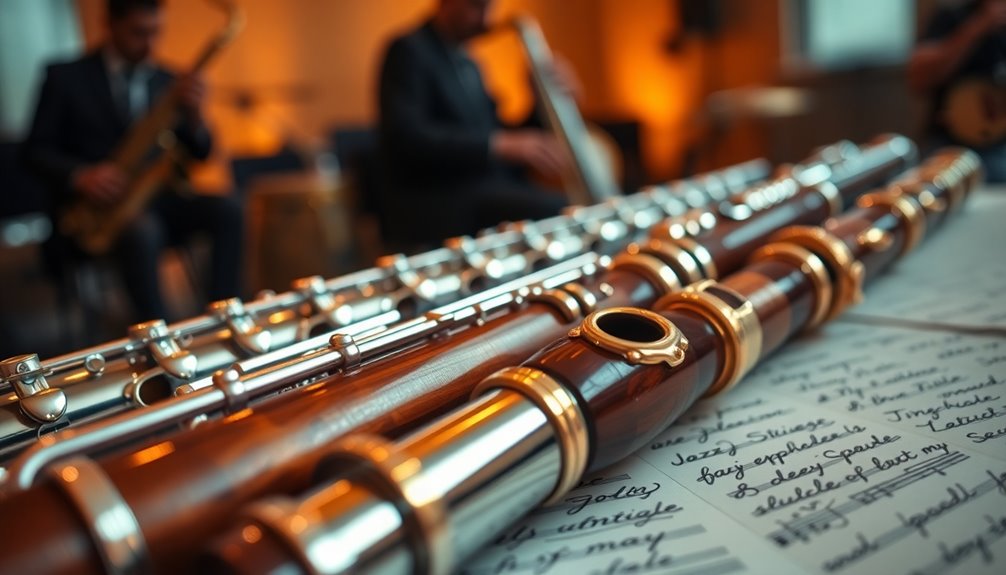
The flute's versatility extends beyond classical music, making it a vibrant choice for jazz. In the jazz world, the flute can express emotion and creativity like few other instruments. When you choose a jazz flute, it's crucial to contemplate how it complements your style and enhances your improvisation skills.
Here are three key factors to ponder when selecting a jazz flute:
- Material: The material affects tone quality. Many jazz musicians prefer silver or gold flutes for their rich, warm sound.
- Brand: Different jazz flute brands offer unique features. Popular choices include Yamaha, Powell, and Gemeinhardt, each bringing its own flair to jazz performance.
- Key Mechanism: Reflect on the key setup. Flutes with split E mechanisms can make high notes easier, which is critical for jazz improvisation techniques.
Jazz flutes are designed for flexibility, enabling you to explore various styles and techniques. The lightweight nature of these flutes allows for quick movement and rapid note changes—key elements in jazz. Additionally, the high-grade stainless steel construction of some models ensures durability while maintaining excellent sound quality.
When you embrace the jazz flute, you're not just playing music; you're joining a community that values innovation and expression.
Whether you're jamming with friends or performing on stage, your choice of flute can help you connect with others who share your passion for this dynamic genre.
Explore, experiment, and let your unique voice shine through your jazz flute.
Folk Music Flutes
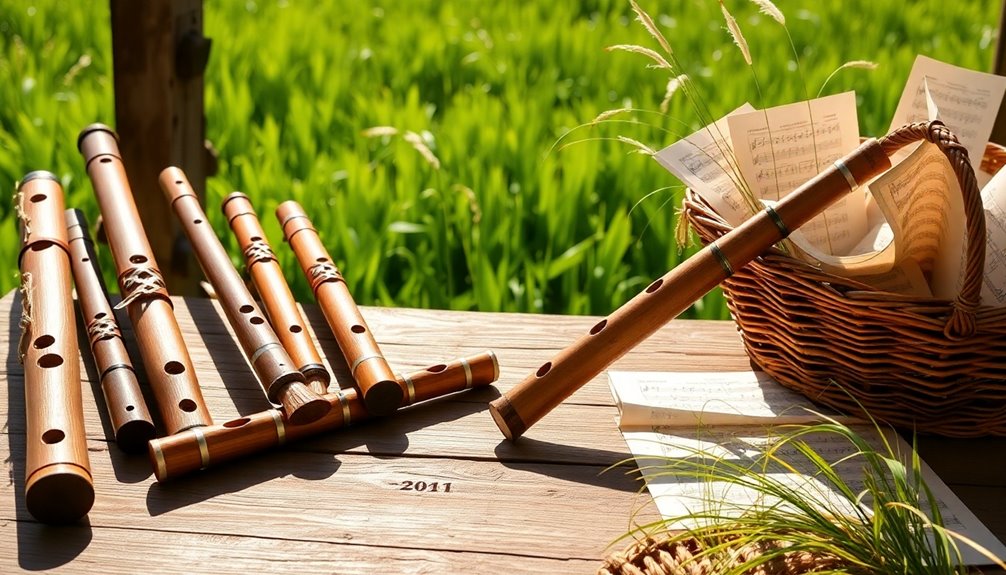
Folk music flutes offer a unique blend of tradition and simplicity that resonates deeply with audiences. When you're exploring the world of traditional folk music, choosing the right flute is essential for capturing its essence. Wooden flutes, known for their warm tones and organic sound, have long been the instrument of choice in folk traditions across various cultures.
If you're drawn to the rich history behind folk music, a wooden flute can connect you to that heritage. These flutes often feature simple designs that allow for a straightforward playing style, making them accessible for both beginners and seasoned musicians.
Their sound carries a natural resonance that complements the storytelling nature of folk music, enhancing the emotional depth of the pieces you play.
When selecting a folk flute, consider factors like the type of wood used and the flute's key. Different woods like bamboo or maple can produce distinct tonal qualities that might suit your musical preferences. Additionally, the size and shape of the flute can affect its playability and sound projection, so it's worth trying a few options before making a decision.
Ultimately, folk music flutes invite you to become part of a community that values tradition and shared experiences. By choosing a wooden flute, you're not just selecting an instrument; you're embracing a legacy that spans generations, allowing you to express your connection to the music and its roots.
Moreover, the craftsmanship involved in making these instruments can significantly influence their overall sound quality, enhancing your musical performance. This sense of belonging is what makes folk music so special.
Contemporary Flutes
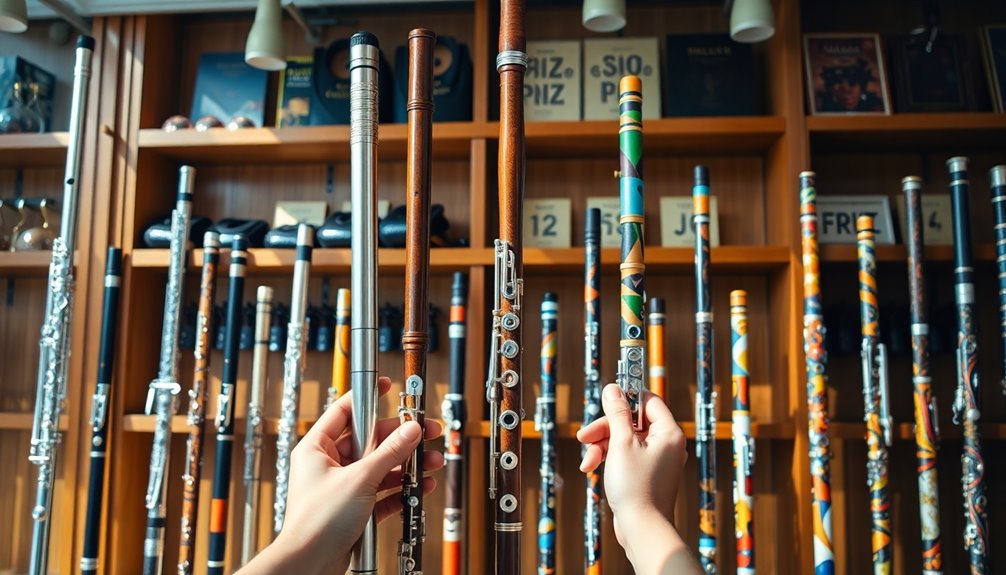
Choosing a contemporary flute opens up a world of versatility and innovation that can elevate your musical expression. If you're considering this type of flute, you'll find that it embraces modern techniques and innovative materials, allowing you to explore unique soundscapes. Here are a few key aspects to keep in mind:
- Material Choices: Contemporary flutes often utilize materials like silver, gold, or even carbon fiber. These innovative materials not only affect the tone but also the durability and responsiveness of the instrument.
- Techniques: Modern techniques such as extended techniques, multiphonics, and electronic integration are becoming increasingly popular. Being familiar with these can greatly expand your performance capabilities, making your music more dynamic.
- Design Features: Many contemporary flutes come with unique design features, such as offset G keys or alternative lip plates, which can enhance playability and comfort, allowing you to focus on your musical expression.
When you choose a contemporary flute, you're not just picking an instrument; you're embracing a philosophy that values creativity and experimentation. This choice reflects your desire to connect with the ever-evolving landscape of music, where boundaries are pushed, and new genres are born. By adopting a contemporary flute, you're joining a vibrant community of musicians who are excited to explore the possibilities of sound in today's world. Furthermore, the incorporation of extended techniques allows for a broader range of expressive possibilities that can significantly enhance your artistry.
World Music Flutes
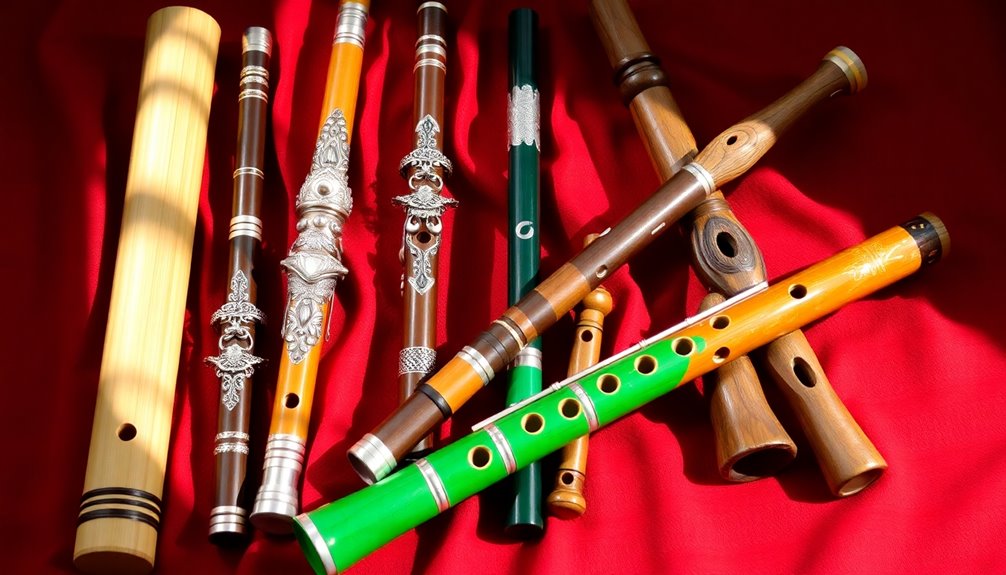
Exploring world music flutes offers you a rich tapestry of cultural sounds and playing techniques that can deeply enhance your musical journey. These flutes reflect diverse traditions from around the globe, each with unique characteristics and tonal qualities shaped by their cultural origins. By understanding these instruments, you can incorporate world music influences into your own playing, broadening your musical horizons.
One of the most notable types is the bamboo flute, commonly used in Indian classical music. Its warm, resonant sound is achieved through traditional flute techniques like circular breathing, which allows for continuous sound production. Learning this technique can elevate your performance and create an enchanting atmosphere in your music.
Another fascinating option is the Native American flute, known for its expressive melodies and soft timbre. This flute typically features a unique two-chamber design that produces hauntingly beautiful sounds. By immersing yourself in the traditional flute techniques associated with this instrument, such as breath control and finger positioning, you can evoke deep emotional connections in your performances.
Lastly, the shakuhachi, a Japanese bamboo flute, emphasizes simplicity and spiritual expression. Its ability to mimic natural sounds allows you to explore meditative themes in your music. Additionally, understanding the different types of flutes, such as the Western Concert Flute, can provide insights into how various flutes can enhance your musical versatility.
Marching Band Flutes
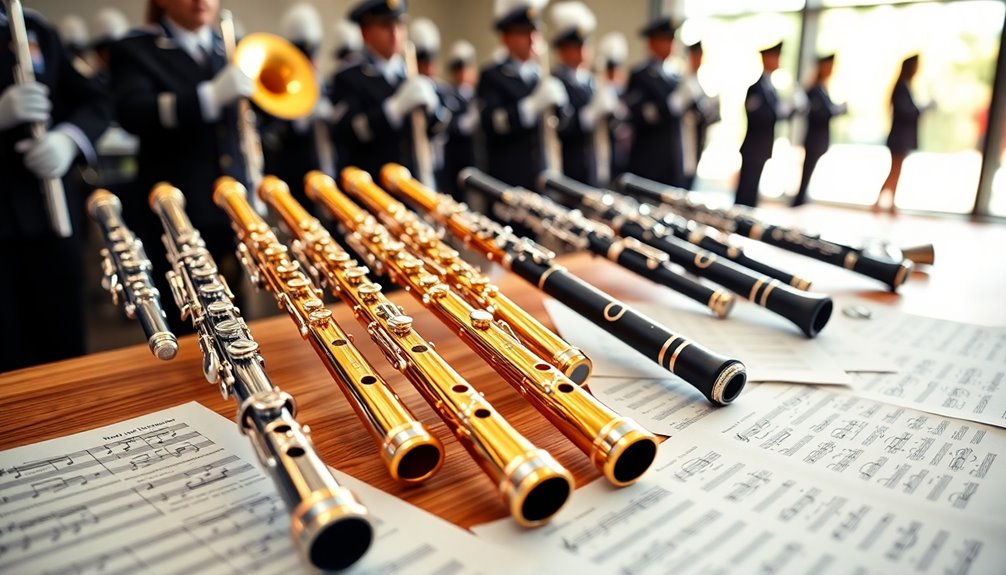
When participating in a marching band, selecting the right flute is vital for both performance quality and ensemble cohesion. The flute you choose can considerably impact your sound and how well you adapt to marching techniques.
Here are three key considerations to keep in mind when selecting a marching band flute:
- Durability: Marching flutes need to withstand outdoor conditions and the rigors of movement. Look for flutes made from materials like silver-plated brass, which are sturdy yet offer a bright sound.
- Weight: Since you'll be moving around, a lightweight flute can make a difference in your comfort and performance. Consider flutes designed specifically for marching, as they're often crafted to reduce weight while maintaining sound quality.
- Maintenance: Regular flute maintenance is essential, especially in a marching band setting. Make sure your flute is easy to clean and maintain, as dirt and moisture can accumulate during outdoor performances. Additionally, investing in a flute made from premium materials can enhance durability and tonal quality.
When you focus on these factors, you'll enhance your playing experience and contribute positively to your band's overall sound.
Frequently Asked Questions
What Is the Best Flute Material for Beginners?
When you're starting out, the best flute material often boils down to plastic vs. metal.
Plastic flutes are lightweight, affordable, and durable, making them great beginner flute options. They handle drops better and require less maintenance.
On the other hand, metal flutes offer a richer tone and are more suited for long-term playing, but they can be pricier.
For beginners, a solid plastic flute is usually the way to go, allowing you to learn comfortably.
How Do I Maintain My Flute for Longevity?
To maintain your flute for longevity, start by implementing effective flute cleaning techniques.
Wipe the flute with a soft cloth after each use to remove moisture and fingerprints. Use a cleaning rod with a cloth to clean the inside.
For flute storage tips, keep it in a hard case when you're not playing. Avoid extreme temperatures and humidity.
Regular maintenance will guarantee your flute stays in great condition, allowing you to enjoy music for years to come.
Can I Use One Flute for Multiple Genres?
Absolutely, you can use one flute for multiple genres! Flute adaptation is key here; many flutes offer genre versatility, allowing you to explore different musical styles without needing multiple instruments.
By adjusting your technique, embouchure, and breath control, you can achieve a sound suitable for classical, jazz, or folk music. This versatility not only enhances your playing experience but also fosters a sense of belonging within diverse musical communities.
What Accessories Are Essential for Flute Players?
Imagine your flute as a prized flower, needing the right care to bloom beautifully.
Vital accessories include a quality flute bag to protect it during transport, much like a vase supports a delicate flower. A cleaning kit is essential, too, helping you maintain your instrument's health and sound quality.
How Do I Choose the Right Flute Size?
When you're choosing the right flute size, consider your player comfort first.
Flute sizes vary, and selecting the appropriate one can enhance your playing experience. For beginners, a standard concert flute usually works best, but if you're smaller or have smaller hands, a curved headjoint might be more suitable.
Always try out different sizes to see what feels right for you. Remember, comfort can greatly impact your performance and enjoyment of playing.
Conclusion
In the end, choosing the right flute for your musical genre is essential to achieving the sound you desire. Each style, from classical to contemporary, has its unique requirements and flavors, so it's important to pick wisely. Don't just go with the flow; consider your personal preferences and the specific demands of the music you'll be playing. By doing your homework, you'll find a flute that truly resonates with your artistic vision and enhances your performance.

